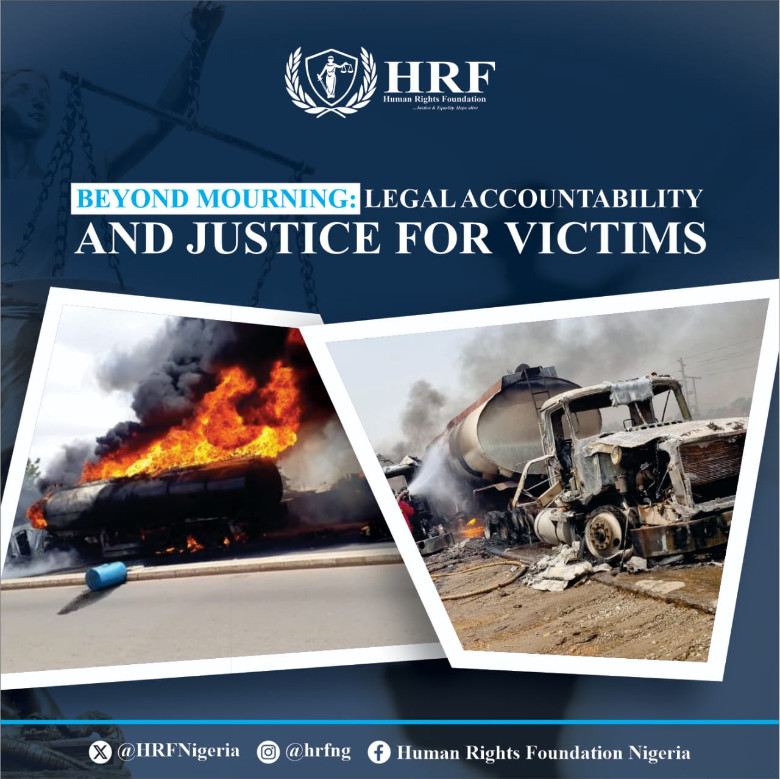
Tanker explosions are a recurring tragedy in Nigeria, leaving devastating human, economic, and environmental consequences. These incidents often result in loss of life, property damage, environmental pollution, and emotional trauma for affected communities. While mourning the victims is essential for communal healing, a critical legal and policy framework is required to prevent future occurrences and ensure accountability and justice for the victims.
Tanker explosions are primarily linked to negligence, regulatory failures, and a lack of effective enforcement mechanisms. Nigerian laws, including the Petroleum Act, the Environmental Impact Assessment Act, and the National Environmental Standards and Regulations Enforcement Agency (NESREA) Act, provide a framework for regulating petroleum transportation. However, implementation remains weak due to corruption, lack of infrastructure, and poor oversight.
Additionally, the Federal Road Safety Corps (FRSC) Act mandates road safety regulations, including monitoring the transportation of hazardous materials. Yet, tanker drivers often operate under unsafe conditions, using poorly maintained vehicles on dilapidated roads.
Causes and Gaps in Regulation
1. Negligence and Human Error: Overloaded or poorly maintained tankers, combined with reckless driving, are the leading causes of explosions. Enforcement of standards for vehicle maintenance and driver training remains inadequate.
2. Infrastructure Deficiency: Many Nigerian roads are in disrepair, increasing the likelihood of accidents involving heavy vehicles like tankers.
3. Regulatory Failure: Weak enforcement of safety regulations by agencies like NESREA and the Department of Petroleum Resources (DPR) exacerbates the problem.
4. Emergency Response Deficiency: Inadequate emergency response systems prolong the effects of tanker explosions, causing preventable casualties.
In the aftermath of tanker explosions, victims and their families often face challenges in seeking justice and compensation. Nigerian tort law provides avenues for claims based on negligence or strict liability. However, legal hurdles such as high litigation costs, slow judicial processes, and limited legal awareness often impede access to justice.
To move beyond mourning and address the root causes of tanker explosions, the following legal and policy measures are necessary:
1. Strengthening Regulations: Amend existing laws to impose stricter penalties for non-compliance with safety standards and enhance the capacity of regulatory agencies.
2. Improving Road Infrastructure: Invest in road repairs and maintenance to reduce accidents. Dedicated tanker routes could also minimize interactions with other vehicles and pedestrians.
3. Mandatory Insurance Policies: Enforce comprehensive insurance for tankers to ensure victims are adequately compensated.
4. Training and Certification: Implement compulsory training programs for tanker drivers and ensure regular vehicle inspections.
5. Emergency Response Systems: Establish well-equipped and decentralized emergency response units capable of mitigating the impact of tanker explosions.
6. Public Awareness Campaigns: Educate communities on the dangers of siphoning fuel from overturned tankers and promote safety awareness.
Tanker explosions in Nigeria are not just a series of unfortunate accidents but a symptom of systemic failures in regulation, enforcement, and infrastructure. Beyond mourning the victims, stakeholders—including government, industry players, and civil society—must collaborate to address these challenges. Strengthening the legal and policy framework is essential to preventing future tragedies, ensuring accountability, and fostering a safer environment for all Nigerians. Only through decisive action can the cycle of loss and suffering be broken.



.jpg)
0 Comments